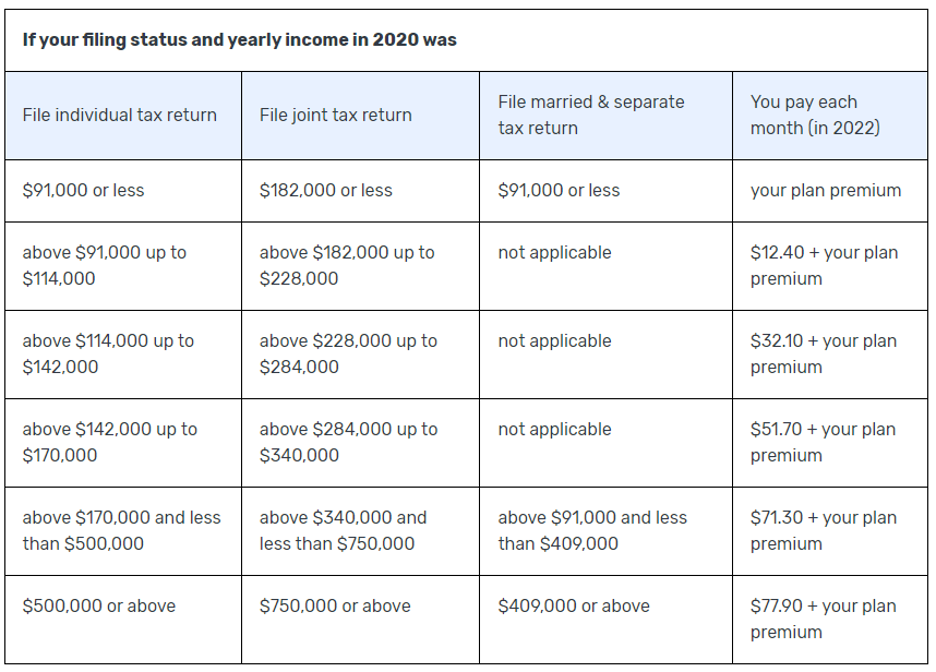If you’re retired and have health insurance through the Affordable Care Act (ACA) or Medicare, your premiums are directly related to your Modified Adjusted Gross Income (or “MAGI”). The higher your income, the higher your premiums.
Unless you prepare your own tax return, you probably don’t know how your MAGI is calculated. But ignorance is definitely not bliss when it comes to your MAGI. In fact, it can cost you.
By managing your MAGI, you may able to reduce your ACA health insurance premiums and your Medicare premiums. So, let’s discuss how your MAGI is calculated and explore how to control it.
Total Income
We need to first understand what you’re required to report to the Internal Revenue Service on your tax return, Form 1040. Before we can determine your MAGI, we need to know your Adjusted Gross Income (or “AGI”). But to calculate your AGI, we need to know your Total Income.
Taken directly from Form 1040, your Total Income includes the following items:
- Wages, salaries, tips, etc.
- Taxable interest
- Ordinary dividends
- IRA distributions (taxable)
- Pensions and (taxable) annuity distributions
- Capital gains/losses
Adjusted Gross Income
Now, to calculat your Adjusted Gross Income, we need to adjust for items that come from Schedule 1, line 22. These items include:
- Educator expense
- Certain business expenses for reservists, performing artists, and fee-basis government officials
- Health savings account deduction
- Moving expenses for members of the armed forces
- Deductible part of self-employment tax
- Self-employed SEP, SIMPLE and qualified plans
- Self-employed health insurance deduction
- Penalty on early withdrawal of savings
- Alimony paid
- IRA deduction
- Student loan interest deduction
- Tuition and fees deduction
Note: If you’re retired, you probably don’t have many, if any, of these adjustments.
You also get to subtract your charitable contributions (if you take the standard deduction) (found on line 10b).
Finally, by subtracting these adjustments from your total income, we get to line 11 on Form 1040, which is your Adjusted Gross Income.
Modified Adjusted Gross Income (MAGI)
Now it gets a bit more complicated. To determine your MAGI, we have to consider certain government benefits.
Medicare Part B and MAGI
Let’s start with Medicare Part B, which is government health insurance that pays for services from doctors and health care providers, outpatient care, home health care, durable medical equipment and some preventative services.
The premiums for Medicare Part B are based on your MAGI from two years ago. This the most recent tax return information provided to Medicare by the IRS.
Your MAGI for Medicare Part B is the sum of (a) your AGI plus (b) tax-exempt interest income (line 2a on IRS Form 1040). Examples of tax-exempt interest income include income from municipal bonds and income producing assets inside a Roth retirement account.
In 2022, the standard Medicare Part B premium is $170.10.
However, if your MAGI is above a certain amount, you’ll pay the standard premium and an Income Related Monthly Adjustment Amount (or “IRMAA”). The IRMAA is an extra charge added to your standard premium.

Medicare Part D and MAGI
A similar situation exists with respect to Medicare Part D, which helps pay for prescription drugs.
As with Medicare Part B, the premiums for Medicare Part D are based on your MAGI and we use the same method to calculate MAGI.
Your Medicare Part D premiums are $0 if your MAGI is below $91,000 (on an individual tax return) or $182,000 (on a joint tax return). If your MAGI is above those levels, you will pay your plan premium plus an IRMAA. As before, the IRMAA is an extra charge added to your standard premium.

Affordable Care Act Subsidies
If you purchase health insurance through the ACA, you may be eligible for premium tax credits if your household MAGI is below 400% of the federal poverty level (which varies based on the number of people in the household and the state you live in). For coverage in the continental U.S., the amount is $54,360 for an individual and $111,000 for a family of four.
MAGI for the purposes of the ACA adds back non-taxable Social Security benefits, deducted foreign income and tax-exempt interest.
Congress passed the American Rescue Plan Act in March of 2021. This legislation made health insurance coverage through the ACA more affordable. It did so by temporarily eliminating the income cap for premium subsidies. The result is that no one will have to pay more than 8.5% of their household income for the ACA’s benchmark plan. In addition, the legislation provides larger subsidies for ACA buyers at all income levels.
If you’re interested in learning what an ACA plan might cost, you can use the calculator at HealthCare.gov.
Recalculating IRMAA
If you’re subject to IRMAA and if your financial situation has changed significantly, you may wish to contact Medicare and request a modification. There are several “life-changing events” that qualify for recalculating an IRMAA:
- Marriage
- Divorce/annulment
- Death of spouse
- Loss of job or reduction in hours worked
- Loss of income-generating property
- Reduction in or loss of pension
- Settlement from an employer
How to Manage Your MAGI
Now that you understand how important your MAGI is for determining your Medicare and ACA premiums, let’s consider ways to manage your MAGI.
If you’re age 70 1/2 or older, you can make Qualified Charitable Distributions (or “QCDs”) from your IRA. The QCD will help satisfy your Required Minimum Distributions, which begin at age 72. The amount of your QCD will be excluded from your income, up to a total of $100,000. If you file a joint return, you and your spouse can both make a QCD. So, a QCD is a way to reduce your taxable income and benefit your preferred charity.
The income from a home equity conversion mortgage (or “HECM”), also called a reverse mortgage, could be a way to generate income that isn’t included in your MAGI. You could use a reverse mortgage if you need income, but want to minimize taxable distributions from your retirement or brokerage accounts.
Withdrawals from cash value life insurance may also be a way to generate income that isn’t captured in the MAGI calculation. There are several ways to take money from a permanent life insurance policy. You may be able to withdraw part of your basis (i.e., your original investment) tax-free. You can also borrow from your life insurance. Borrowing will create a loan, and there will be interest due on the loan. So, be careful that the loan doesn’t eventually cause the policy to lapse. If that were to happen, the result could be a significant taxable event.
If you use funds to invest, you should consider exchanged-traded funds (“ETFs”) instead of mutual funds. ETFs are inherently more tax efficient than mutual funds. The reasons for this are beyond the scope of this article. But if you invest in ETFs, you’ll be less likely to incur capital gains than you would if you owned comparable mutual funds.
There are several actions you should generally avoid if you’re trying to minimize your MAGI and thereby minimize your Medicare premiums or maximize your ACA subsidy. Don’t sell highly appreciated assets. Don’t make Roth conversions. Don’t take large distributions from retirement plans. Don’t take Social Security early (or even at Full Retirement Age) unless you absolutely must.
Understanding IRMAA and Your Premiums – Special Offer
By now you can probably see how managing your MAGI can help you avoid IRMAA.
We can help you understand whether you’ll be subject to IRMAA, and work with you to develop a strategy to avoid those higher Medicare costs.
Get your free guide to understanding IRMAA
Getting Help with Retirement Income Planning
If you need help putting together your income plan for retirement, consider working with a Certified Financial Planner™ (CFP), Certified Public Accountant (CPA) with the Personal Financial Specialist (PFS) credential, a Chartered Financial Consultant (ChFC®) or a Retirement Income Certified Professional® (RICP®). Advisors who hold these designations had to meet rigorous educational, experience and ethics requirements.
If you’d like to schedule a complimentary consultation to discuss your situation, contact us.
